Biblical Moment: The Events of Holy Tuesday during Holy Week Leading Up to Easter!
 My childhood memory recalls Palm Sunday and then a skip to The Last Supper on Holy Thursday; with Holy Monday, Tuesday, and Wednesday as being some kind of filler to make Holy Week a full week.
My childhood memory recalls Palm Sunday and then a skip to The Last Supper on Holy Thursday; with Holy Monday, Tuesday, and Wednesday as being some kind of filler to make Holy Week a full week.
Nothing can be further from the truth as with Jesus the unexpected are expected and the common place seem to become miraculous!
Maybe we should look as Monday, Tuesday, Wednesday as a one-two-three-are we ready for the Passion of Our Lord and Savior; His Suffering which likely will be our suffering to some degree, hopefully minimal, as we age, decline and ultimately die with nobody other than Our Lord and Savior.
The Lenten Season is not over! We still have time to prepare; especially within our hearts, souls, and bodies.
The biblical references for the events of Holy Tuesday center around this preparedness. Are we ready to experience the Death, Crucifixion, and Resurrection of Jesus?
What sort of Virgin are we in the Parable of the Ten Virgins below? Is our bodily temple ready to finish the race strong? Do we do our spiritual exercises so as to always be in the right spiritual frame of mind? Are we gassed up like our cars all ready to go the distance of needed in an emergency?
What have we done with the gifts God has bestowed on each and every one of us? Have we given up trying to seek and find them? Are we still developing them and using them according to the Will of God or our own pride and ego-driven ways?
Are our talents buried in the ground like the one who received one talent in the Parable of the Talents? What are we missing out on in life as designed by God? True Love and deep and meaningful relationships with others? First with ourselves? We can only give away what we have.
The Christian Holy Week continues tomorrow with Holy Wednesday—wrapping up the last week of the Lenten Season—Palm Sunday (Jesus Enters Jerusalem apparently as a King)—Holy Monday (Cleansing of the Temple)—Holy Tuesday (Parables of the Talents and Ten Virgins)—Holy Wednesday (Betrayal by Judas)—Holy Thursday (Washing of the Feet and the Last Supper)—Good Friday (Passion, Crucifixion, and Death of Jesus on the Cross at Calvary)—Holy Saturday (Jesus Lays in the Tomb on the Sabbath)—and Easter Sunday (Resurrection of Jesus; The Empty Tomb and The Good News).
God Bless and see you on the other side!
 “Then the Kingdom of Heaven will be like ten virgins who took their lamps and went out to meet the bridegroom. Five of them were foolish and five were wise. The foolish ones, when taking their lamps, brought no oil with them, but the wise brought flasks of oil with their lamps. Since the bridegroom was long delayed, they all became drowsy and fell asleep. At midnight, there was a cry, ‘Behold, the bridegroom! Come out to meet him!’ Then all those virgins got up and trimmed their lamps. The foolish ones said to the wise, ‘Give us some of your oil, for our lamps are going out.’ But the wise ones replied, ‘No, for there may not be enough for us and you. Go instead to the merchants and buy some for yourselves.’ While they went off to buy it, the bridegroom came and those who were ready went into the wedding feast with him. Then the door was locked. Afterwards the other virgins came and said, ‘Lord, Lord, open the door for us!’ But He said in reply, ‘Amen, I say to you, I do not know you.’ Therefore, stay awake, for you know neither the day nor the hour.”
“Then the Kingdom of Heaven will be like ten virgins who took their lamps and went out to meet the bridegroom. Five of them were foolish and five were wise. The foolish ones, when taking their lamps, brought no oil with them, but the wise brought flasks of oil with their lamps. Since the bridegroom was long delayed, they all became drowsy and fell asleep. At midnight, there was a cry, ‘Behold, the bridegroom! Come out to meet him!’ Then all those virgins got up and trimmed their lamps. The foolish ones said to the wise, ‘Give us some of your oil, for our lamps are going out.’ But the wise ones replied, ‘No, for there may not be enough for us and you. Go instead to the merchants and buy some for yourselves.’ While they went off to buy it, the bridegroom came and those who were ready went into the wedding feast with him. Then the door was locked. Afterwards the other virgins came and said, ‘Lord, Lord, open the door for us!’ But He said in reply, ‘Amen, I say to you, I do not know you.’ Therefore, stay awake, for you know neither the day nor the hour.”
—Matthew 25:1-13 (The Parable of the Ten Virgins)
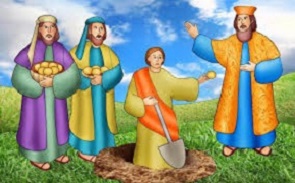 “It will be as when a man who was going on a journey called in his servants and entrusted his possessions to them. To one he gave five talents; to another, two; to a third, one—to each according to his ability.
“It will be as when a man who was going on a journey called in his servants and entrusted his possessions to them. To one he gave five talents; to another, two; to a third, one—to each according to his ability.
Then he went away. Immediately the one who received five talents went and traded with them, and made another five. Likewise, the one who received two made another two. But the man who received one went off and dug a hole in the ground and buried his master’s money.
After a long time the master of those servants came back and settled accounts with them. The one who had received five talents came forward bringing the additional five. He said, ‘Master, you gave me five talents. See, I have made five more.’ His master said to him, ‘Well done, my good and faithful servant. Since you were faithful in small matters, I will give you great responsibilities. Come, share your master’s joy.’
Then the one who had received two talents also came forward and said, ‘Master, you gave me two talents. See, I have made two more.’ His master said to him, ‘Well done, my good and faithful servant. Since you were faithful in small matters, I will give you great responsibilities. Come, share your master’s joy.’
Then the one who had received the one talent came forward and said, ‘Master, I knew you were a demanding person, harvesting where you did not plant and gathering where you did not scatter; so out of fear I went off and buried your talent in the ground. Here it is back.’ His master said to him in reply, ‘You wicked, lazy servant! So you knew that I harvest where I did not plant and gather where I did not scatter? Should you not then have put my money in the bank so that I could have got it back with interest on my return?
Now then! Take the talent from him and give it to the one with ten. For to everyone who has, more will be given and he will grow rich; but from the one who has not, even what he has will be taken away. And throw this useless servant into the darkness outside, where there will be wailing and grinding of teeth.”—Matthew 25:14-30 (The Parable of the Talents)
Other readings to ponder this Holy Tuesday:
 “God said to me, You are My Servant, in you, Israel, I show My Glory… I will make you a light to the nations, that My Salvation may reach to the ends of the earth.”—Isaiah 49:3,6
“God said to me, You are My Servant, in you, Israel, I show My Glory… I will make you a light to the nations, that My Salvation may reach to the ends of the earth.”—Isaiah 49:3,6
“In you, Lord, I take refuge; let me never be put to shame. In Your Justice rescue and deliver me; listen to me and save me! Be my rock of refuge, my stronghold to give me safety; for You are my rock and fortress. My God, rescue me from the hand of the wicked, from the clutches of the evil and violent. You are my hope, Lord; my trust, God, from my youth. On You I have depended since birth; from my mother’s womb You are my strength; my hope in You never wavers.”
—Psalm 71
“My mouth shall proclaim your just deeds, day after day your acts of deliverance, though I cannot number them all.”—Psalm 71:15
“God, you have taught me from my youth; to this day I proclaim your wondrous deeds.”—Psalm 71:17
“Then Job arose and tore his cloak and cut off his hair. He fell to the ground and worshiped. He said, “Naked I came forth from my mother’s womb, and naked shall I go back there. The Lord gave and the Lord has taken away; blessed be the name of the Lord!” In all this Job did not sin, nor did he charge God with wrong.”—Job 1:20-22
“The message of the cross is foolishness to those who are perishing, but to us who are being saved it is the Power of God. For it is written: “I will destroy the wisdom of the wise, and the learning of the learned I will set aside.”
Where is the wise one? Where is the scribe? Where is the debater of this age? Has not God made the wisdom of the world foolish? For since in the Wisdom of God the world did not come to know God through wisdom, it was the Will of God through the foolishness of the proclamation to save those who have faith. For Jews demand signs and Greeks look for wisdom, but we proclaim Christ crucified, a stumbling block to Jews and foolishness to Gentiles, but to those who are called, Jews and Greeks alike, Christ the Power of God and he Wisdom of God. For the foolishness of God is wiser than human wisdom, and the weakness of God is stronger than human strength.”—1 Corinthians 1:18-25
“Consider your own calling, brothers. Not many of you were wise by human standards, not many were powerful, not many were of noble birth. Rather, God chose the foolish of the world to shame the wise, and God chose the weak of the world to shame the strong, and God chose the lowly and despised of the world, those who count for nothing, to reduce to nothing those who are something, so that no human being might boast before God. It is due to him that you are in Christ Jesus, who became for us wisdom from God, as well as righteousness, sanctification, and redemption, so that, as it is written, “Whoever boasts, should boast in the Lord.”—1 Corinthians 1:26-31
 “Almighty, everlasting God, grant us so perfectly to follow the passion of our Lord, that we may obtain the help and pardon of His all-sufficient grace; through Him who lives and reigns with You, in the Unity of the Holy Spirit, world without end. Amen.”—Methodist Collect for Holy Tuesday
“Almighty, everlasting God, grant us so perfectly to follow the passion of our Lord, that we may obtain the help and pardon of His all-sufficient grace; through Him who lives and reigns with You, in the Unity of the Holy Spirit, world without end. Amen.”—Methodist Collect for Holy Tuesday
 All of the 40 days and 40 nights of the Lenten Season and the early part of Holy Week is a preparation for the events to come later in the week—namely the Passion. Death, and Resurrection of Jesus Christ.
All of the 40 days and 40 nights of the Lenten Season and the early part of Holy Week is a preparation for the events to come later in the week—namely the Passion. Death, and Resurrection of Jesus Christ. “When Jesus finished all these words, he said to His Disciples, “You know that in two days’ time it will be Passover, and the Son of Man will be handed over to be crucified.” Then the chief priests and the elders of the people assembled in the palace of the high priest, who was called Caiaphas, and they consulted together to arrest Jesus by treachery and put Him to death. But they said, “Not during the festival, that there may not be a riot among the people.”—Matthew 26:1-5
“When Jesus finished all these words, he said to His Disciples, “You know that in two days’ time it will be Passover, and the Son of Man will be handed over to be crucified.” Then the chief priests and the elders of the people assembled in the palace of the high priest, who was called Caiaphas, and they consulted together to arrest Jesus by treachery and put Him to death. But they said, “Not during the festival, that there may not be a riot among the people.”—Matthew 26:1-5 “When Jesus was going back to the city in the morning, He was hungry. Seeing a fig tree by the road, He went over to it, but found nothing on it except leaves. And He said to it, “May no fruit ever come from you again.” And immediately the fig tree withered. When the disciples saw this, they were amazed and said, “How was it that the fig tree withered immediately?” Jesus said to them in reply, “Amen, I say to you, if you have faith and do not waver, not only will you do what has been done to the fig tree, but even if you say to this mountain, ‘Be lifted up and thrown into the sea,’ it will be done. Whatever you ask for in prayer with faith, you will receive.”—Matthew 21:18-22
“When Jesus was going back to the city in the morning, He was hungry. Seeing a fig tree by the road, He went over to it, but found nothing on it except leaves. And He said to it, “May no fruit ever come from you again.” And immediately the fig tree withered. When the disciples saw this, they were amazed and said, “How was it that the fig tree withered immediately?” Jesus said to them in reply, “Amen, I say to you, if you have faith and do not waver, not only will you do what has been done to the fig tree, but even if you say to this mountain, ‘Be lifted up and thrown into the sea,’ it will be done. Whatever you ask for in prayer with faith, you will receive.”—Matthew 21:18-22 “Then Jesus entered the Temple and drove out all who were selling and buying in the temple, and He overturned the tables of the money changers and the seats of those who sold doves. He said to them, “It is written, ‘My House shall be called a House of Prayer’; but you are making it a den of robbers.”
“Then Jesus entered the Temple and drove out all who were selling and buying in the temple, and He overturned the tables of the money changers and the seats of those who sold doves. He said to them, “It is written, ‘My House shall be called a House of Prayer’; but you are making it a den of robbers.” “When Jesus had come into the Temple area, the chief priests and the elders of the people approached Him as He was teaching and said, “By what authority are you doing these things? And who gave you this authority?” Jesus said to them in reply, “I shall ask you one question, and if you answer it for me, then I shall tell you by what authority I do these things. Where was John’s baptism from? Was it of heavenly or of human origin?” They discussed this among themselves and said, “If we say ‘Of heavenly origin,’ He will say to us, ‘Then why did you not believe him?’ But if we say, ‘Of human origin,’ we fear the crowd, for they all regard John as a Prophet.” So they said to Jesus in reply, “We do not know.” He himself said to them, “Neither shall I tell you by what authority I do these things.”
“When Jesus had come into the Temple area, the chief priests and the elders of the people approached Him as He was teaching and said, “By what authority are you doing these things? And who gave you this authority?” Jesus said to them in reply, “I shall ask you one question, and if you answer it for me, then I shall tell you by what authority I do these things. Where was John’s baptism from? Was it of heavenly or of human origin?” They discussed this among themselves and said, “If we say ‘Of heavenly origin,’ He will say to us, ‘Then why did you not believe him?’ But if we say, ‘Of human origin,’ we fear the crowd, for they all regard John as a Prophet.” So they said to Jesus in reply, “We do not know.” He himself said to them, “Neither shall I tell you by what authority I do these things.” “Now when Jesus was in Bethany in the house of Simon the leper, a woman came up to him with an alabaster jar of costly perfumed oil, and poured it on His Head while He was reclining at table. When the disciples saw this, they were indignant and said, “Why this waste? It could have been sold for much, and the money given to the poor.” Since Jesus knew this, He said to them, “Why do you make trouble for the woman? She has done a good thing for me. The poor you will always have with you; but you will not always have Me. In pouring this perfumed oil upon My Body, she did it to prepare me for burial. Amen, I say to you, wherever this gospel is proclaimed in the whole world, what she has done will be spoken of, in memory of her.”—Matthew 26:6-13
“Now when Jesus was in Bethany in the house of Simon the leper, a woman came up to him with an alabaster jar of costly perfumed oil, and poured it on His Head while He was reclining at table. When the disciples saw this, they were indignant and said, “Why this waste? It could have been sold for much, and the money given to the poor.” Since Jesus knew this, He said to them, “Why do you make trouble for the woman? She has done a good thing for me. The poor you will always have with you; but you will not always have Me. In pouring this perfumed oil upon My Body, she did it to prepare me for burial. Amen, I say to you, wherever this gospel is proclaimed in the whole world, what she has done will be spoken of, in memory of her.”—Matthew 26:6-13 Here are the biblical accounts of Jesus entering Jerusalem on Palm Sunday–from the four Gospels—Matthew, Mark, Luke, and John. His disciples and followers thinking that he was about to become the king of the ancient secular world at the time they proclaimed: “Blessed is the kingdom of our father David that is to come!”
Here are the biblical accounts of Jesus entering Jerusalem on Palm Sunday–from the four Gospels—Matthew, Mark, Luke, and John. His disciples and followers thinking that he was about to become the king of the ancient secular world at the time they proclaimed: “Blessed is the kingdom of our father David that is to come!”

 “As he drew near to Bethphage and Bethany at the place called the Mount of Olives, He sent two of His Disciples. He said, “Go into the village opposite you, and as you enter it you will find a colt tethered on which no one has ever sat. Untie it and bring it here. And if anyone should ask you, ‘Why are you untying it?’ you will answer, ‘The Master has need of it.’” So those who had been sent went off and found everything just as he had told them. And as they were untying the colt, its owners said to them, “Why are you untying this colt?” They answered, “The Master has need of it.” So they brought it to Jesus, threw their cloaks over the colt, and helped Jesus to mount. As He rode along, the people were spreading their cloaks on the road; and now as He was approaching the slope of the Mount of Olives, the whole multitude of His Disciples began to praise God aloud with joy for all the mighty deeds they had seen. They proclaimed: “Blessed is the King who comes in the name of the Lord. Peace in heaven and glory in the highest.”
“As he drew near to Bethphage and Bethany at the place called the Mount of Olives, He sent two of His Disciples. He said, “Go into the village opposite you, and as you enter it you will find a colt tethered on which no one has ever sat. Untie it and bring it here. And if anyone should ask you, ‘Why are you untying it?’ you will answer, ‘The Master has need of it.’” So those who had been sent went off and found everything just as he had told them. And as they were untying the colt, its owners said to them, “Why are you untying this colt?” They answered, “The Master has need of it.” So they brought it to Jesus, threw their cloaks over the colt, and helped Jesus to mount. As He rode along, the people were spreading their cloaks on the road; and now as He was approaching the slope of the Mount of Olives, the whole multitude of His Disciples began to praise God aloud with joy for all the mighty deeds they had seen. They proclaimed: “Blessed is the King who comes in the name of the Lord. Peace in heaven and glory in the highest.” “On the next day, when the great crowd that had come to the feast heard that Jesus was coming to Jerusalem, they took palm branches and went out to meet Him, and cried out: Hosanna! Blessed is He who comes in the name of the Lord, even the king of Israel.”
“On the next day, when the great crowd that had come to the feast heard that Jesus was coming to Jerusalem, they took palm branches and went out to meet Him, and cried out: Hosanna! Blessed is He who comes in the name of the Lord, even the king of Israel.” In the Bible there are 2,548 references to Israel—the people, the land, this country on the eastern end of the Mediterranean Sea. There are 645 Topical Indexes ranging alphabetically from Aaron to Zuzims!
In the Bible there are 2,548 references to Israel—the people, the land, this country on the eastern end of the Mediterranean Sea. There are 645 Topical Indexes ranging alphabetically from Aaron to Zuzims! Because the world is confusing, I am confusing within and so is every other human being. I seek spiritual solutions to living in this secular and religious world of confusion. I seek answers for my life here on Earth and beyond. I want to see beyond what seems to be—within me and in the world as we know it today!
Because the world is confusing, I am confusing within and so is every other human being. I seek spiritual solutions to living in this secular and religious world of confusion. I seek answers for my life here on Earth and beyond. I want to see beyond what seems to be—within me and in the world as we know it today! Aaron: Commissioned as a deliverer of Israel… his first biblical reference being:
Aaron: Commissioned as a deliverer of Israel… his first biblical reference being:


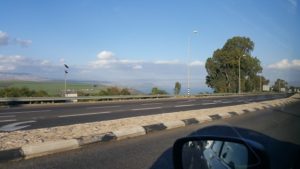





 Biblical Moment No. 4 of Andy’s Spiritual Journey to Israel & Palestine; in Caesarea where Paul appeared in the Audience Hall of King Herod’s Palace… with artifacts of Pontius Pilate…
Biblical Moment No. 4 of Andy’s Spiritual Journey to Israel & Palestine; in Caesarea where Paul appeared in the Audience Hall of King Herod’s Palace… with artifacts of Pontius Pilate… Then Paul, after that the governor had beckoned unto him to speak, answered, Forasmuch as I know that thou hast been of many years a judge unto this nation, I do the more cheerfully answer for myself: Because that thou mayest understand, that there are yet but twelve days since I went up to Jerusalem for to worship. And they neither found me in the temple disputing with any man, neither raising up the people, neither in the synagogues, nor in the city: Neither can they prove the things whereof they now accuse me. But this I confess unto thee, that after the way which they call heresy, so worship I the God of my fathers, believing all things which are written in the law and in the prophets: And have hope toward God, which they themselves also allow, that there shall be a resurrection of the dead, both of the just and unjust. And herein do I exercise myself, to have always a conscience void of offence toward God, and toward men.
Then Paul, after that the governor had beckoned unto him to speak, answered, Forasmuch as I know that thou hast been of many years a judge unto this nation, I do the more cheerfully answer for myself: Because that thou mayest understand, that there are yet but twelve days since I went up to Jerusalem for to worship. And they neither found me in the temple disputing with any man, neither raising up the people, neither in the synagogues, nor in the city: Neither can they prove the things whereof they now accuse me. But this I confess unto thee, that after the way which they call heresy, so worship I the God of my fathers, believing all things which are written in the law and in the prophets: And have hope toward God, which they themselves also allow, that there shall be a resurrection of the dead, both of the just and unjust. And herein do I exercise myself, to have always a conscience void of offence toward God, and toward men. And when Felix heard these things, having more perfect knowledge of that way, he deferred them, and said, When Lysias the chief captain shall come down, I will know the uttermost of your matter. And he commanded a centurion to keep Paul, and to let him have liberty, and that he should forbid none of his acquaintance to minister or come unto him. And after certain days, when Felix came with his wife Drusilla, which was a Jewess, he sent for Paul, and heard him concerning the faith in Christ. And as he reasoned of righteousness, temperance, and judgment to come, Felix trembled, and answered, Go thy way for this time; when I have a convenient season, I will call for thee. He hoped also that money should have been given him of Paul, that he might loose him: wherefore he sent for him the oftener, and communed with him. But after two years Porcius Festus came into Felix’ room: and Felix, willing to shew the Jews a pleasure, left Paul bound.”
And when Felix heard these things, having more perfect knowledge of that way, he deferred them, and said, When Lysias the chief captain shall come down, I will know the uttermost of your matter. And he commanded a centurion to keep Paul, and to let him have liberty, and that he should forbid none of his acquaintance to minister or come unto him. And after certain days, when Felix came with his wife Drusilla, which was a Jewess, he sent for Paul, and heard him concerning the faith in Christ. And as he reasoned of righteousness, temperance, and judgment to come, Felix trembled, and answered, Go thy way for this time; when I have a convenient season, I will call for thee. He hoped also that money should have been given him of Paul, that he might loose him: wherefore he sent for him the oftener, and communed with him. But after two years Porcius Festus came into Felix’ room: and Felix, willing to shew the Jews a pleasure, left Paul bound.”  While he answered for himself, Neither against the law of the Jews, neither against the temple, nor yet against Caesar, have I offended any thing at all. But Festus, willing to do the Jews a pleasure, answered Paul, and said, Wilt thou go up to Jerusalem, and there be judged of these things before me? Then said Paul, I stand at Caesar’s judgment seat, where I ought to be judged: to the Jews have I done no wrong, as thou very well knowest. For if I be an offender, or have committed any thing worthy of death, I refuse not to die: but if there be none of these things whereof these accuse me, no man may deliver me unto them. I appeal unto Caesar. Then Festus, when he had conferred with the council, answered, Hast thou appealed unto Caesar? unto Caesar shalt thou go.
While he answered for himself, Neither against the law of the Jews, neither against the temple, nor yet against Caesar, have I offended any thing at all. But Festus, willing to do the Jews a pleasure, answered Paul, and said, Wilt thou go up to Jerusalem, and there be judged of these things before me? Then said Paul, I stand at Caesar’s judgment seat, where I ought to be judged: to the Jews have I done no wrong, as thou very well knowest. For if I be an offender, or have committed any thing worthy of death, I refuse not to die: but if there be none of these things whereof these accuse me, no man may deliver me unto them. I appeal unto Caesar. Then Festus, when he had conferred with the council, answered, Hast thou appealed unto Caesar? unto Caesar shalt thou go. And after certain days king Agrippa and Bernice came unto Caesarea to salute Festus. And when they had been there many days, Festus declared Paul’s cause unto the king, saying, There is a certain man left in bonds by Felix: About whom, when I was at Jerusalem, the chief priests and the elders of the Jews informed me, desiring to have judgment against him. To whom I answered, It is not the manner of the Romans to deliver any man to die, before that he which is accused have the accusers face to face, and have licence to answer for himself concerning the crime laid against him. Therefore, when they were come hither, without any delay on the morrow I sat on the judgment seat, and commanded the man to be brought forth. Against whom when the accusers stood up, they brought none accusation of such things as I supposed: But had certain questions against him of their own superstition, and of one Jesus, which was dead, whom Paul affirmed to be alive. And because I doubted of such manner of questions, I asked him whether he would go to Jerusalem, and there be judged of these matters. But when Paul had appealed to be reserved unto the hearing of Augustus, I commanded him to be kept till I might send him to Caesar.
And after certain days king Agrippa and Bernice came unto Caesarea to salute Festus. And when they had been there many days, Festus declared Paul’s cause unto the king, saying, There is a certain man left in bonds by Felix: About whom, when I was at Jerusalem, the chief priests and the elders of the Jews informed me, desiring to have judgment against him. To whom I answered, It is not the manner of the Romans to deliver any man to die, before that he which is accused have the accusers face to face, and have licence to answer for himself concerning the crime laid against him. Therefore, when they were come hither, without any delay on the morrow I sat on the judgment seat, and commanded the man to be brought forth. Against whom when the accusers stood up, they brought none accusation of such things as I supposed: But had certain questions against him of their own superstition, and of one Jesus, which was dead, whom Paul affirmed to be alive. And because I doubted of such manner of questions, I asked him whether he would go to Jerusalem, and there be judged of these matters. But when Paul had appealed to be reserved unto the hearing of Augustus, I commanded him to be kept till I might send him to Caesar. Then Agrippa said unto Festus, I would also hear the man myself. To morrow, said he, thou shalt hear him. And on the morrow, when Agrippa was come, and Bernice, with great pomp, and was entered into the place of hearing, with the chief captains, and principal men of the city, at Festus’ commandment Paul was brought forth. And Festus said, King Agrippa, and all men which are here present with us, ye see this man, about whom all the multitude of the Jews have dealt with me, both at Jerusalem, and also here, crying that he ought not to live any longer. But when I found that he had committed nothing worthy of death, and that he himself hath appealed to Augustus, I have determined to send him. Of whom I have no certain thing to write unto my lord. Wherefore I have brought him forth before you, and specially before thee, O king Agrippa, that, after examination had, I might have somewhat to write. For it seemeth to me unreasonable to send a prisoner, and not withal to signify the crimes laid against him.”
Then Agrippa said unto Festus, I would also hear the man myself. To morrow, said he, thou shalt hear him. And on the morrow, when Agrippa was come, and Bernice, with great pomp, and was entered into the place of hearing, with the chief captains, and principal men of the city, at Festus’ commandment Paul was brought forth. And Festus said, King Agrippa, and all men which are here present with us, ye see this man, about whom all the multitude of the Jews have dealt with me, both at Jerusalem, and also here, crying that he ought not to live any longer. But when I found that he had committed nothing worthy of death, and that he himself hath appealed to Augustus, I have determined to send him. Of whom I have no certain thing to write unto my lord. Wherefore I have brought him forth before you, and specially before thee, O king Agrippa, that, after examination had, I might have somewhat to write. For it seemeth to me unreasonable to send a prisoner, and not withal to signify the crimes laid against him.”  My manner of life from my youth, which was at the first among mine own nation at Jerusalem, know all the Jews; Which knew me from the beginning, if they would testify, that after the most straitest sect of our religion I lived a Pharisee. And now I stand and am judged for the hope of the promise made of God unto our fathers: Unto which promise our twelve tribes, instantly serving God day and night, hope to come. For which hope’s sake, king Agrippa, I am accused of the Jews. Why should it be thought a thing incredible with you, that God should raise the dead? I verily thought with myself, that I ought to do many things contrary to the name of Jesus of Nazareth. Which thing I also did in Jerusalem: and many of the saints did I shut up in prison, having received authority from the chief priests; and when they were put to death, I gave my voice against them. And I punished them oft in every synagogue, and compelled them to blaspheme; and being exceedingly mad against them, I persecuted them even unto strange cities.
My manner of life from my youth, which was at the first among mine own nation at Jerusalem, know all the Jews; Which knew me from the beginning, if they would testify, that after the most straitest sect of our religion I lived a Pharisee. And now I stand and am judged for the hope of the promise made of God unto our fathers: Unto which promise our twelve tribes, instantly serving God day and night, hope to come. For which hope’s sake, king Agrippa, I am accused of the Jews. Why should it be thought a thing incredible with you, that God should raise the dead? I verily thought with myself, that I ought to do many things contrary to the name of Jesus of Nazareth. Which thing I also did in Jerusalem: and many of the saints did I shut up in prison, having received authority from the chief priests; and when they were put to death, I gave my voice against them. And I punished them oft in every synagogue, and compelled them to blaspheme; and being exceedingly mad against them, I persecuted them even unto strange cities. Whereupon as I went to Damascus with authority and commission from the chief priests, At midday, O king, I saw in the way a light from heaven, above the brightness of the sun, shining round about me and them which journeyed with me. And when we were all fallen to the earth, I heard a voice speaking unto me, and saying in the Hebrew tongue, Saul, Saul, why persecutest thou me? it is hard for thee to kick against the pricks. And I said, Who art thou, Lord? And he said, I am Jesus whom thou persecutest. But rise, and stand upon thy feet: for I have appeared unto thee for this purpose, to make thee a minister and a witness both of these things which thou hast seen, and of those things in the which I will appear unto thee; Delivering thee from the people, and from the Gentiles, unto whom now I send thee, To open their eyes, and to turn them from darkness to light, and from the power of Satan unto God, that they may receive forgiveness of sins, and inheritance among them which are sanctified by faith that is in me.
Whereupon as I went to Damascus with authority and commission from the chief priests, At midday, O king, I saw in the way a light from heaven, above the brightness of the sun, shining round about me and them which journeyed with me. And when we were all fallen to the earth, I heard a voice speaking unto me, and saying in the Hebrew tongue, Saul, Saul, why persecutest thou me? it is hard for thee to kick against the pricks. And I said, Who art thou, Lord? And he said, I am Jesus whom thou persecutest. But rise, and stand upon thy feet: for I have appeared unto thee for this purpose, to make thee a minister and a witness both of these things which thou hast seen, and of those things in the which I will appear unto thee; Delivering thee from the people, and from the Gentiles, unto whom now I send thee, To open their eyes, and to turn them from darkness to light, and from the power of Satan unto God, that they may receive forgiveness of sins, and inheritance among them which are sanctified by faith that is in me. Whereupon, O king Agrippa, I was not disobedient unto the heavenly vision: But shewed first unto them of Damascus, and at Jerusalem, and throughout all the coasts of Judaea, and then to the Gentiles, that they should repent and turn to God, and do works meet for repentance. For these causes the Jews caught me in the temple, and went about to kill me. Having therefore obtained help of God, I continue unto this day, witnessing both to small and great, saying none other things than those which the prophets and Moses did say should come: That Christ should suffer, and that he should be the first that should rise from the dead, and should shew light unto the people, and to the Gentiles. And as he thus spake for himself, Festus said with a loud voice, Paul, thou art beside thyself; much learning doth make thee mad. But he said, I am not mad, most noble Festus; but speak forth the words of truth and soberness. For the king knoweth of these things, before whom also I speak freely: for I am persuaded that none of these things are hidden from him; for this thing was not done in a corner.
Whereupon, O king Agrippa, I was not disobedient unto the heavenly vision: But shewed first unto them of Damascus, and at Jerusalem, and throughout all the coasts of Judaea, and then to the Gentiles, that they should repent and turn to God, and do works meet for repentance. For these causes the Jews caught me in the temple, and went about to kill me. Having therefore obtained help of God, I continue unto this day, witnessing both to small and great, saying none other things than those which the prophets and Moses did say should come: That Christ should suffer, and that he should be the first that should rise from the dead, and should shew light unto the people, and to the Gentiles. And as he thus spake for himself, Festus said with a loud voice, Paul, thou art beside thyself; much learning doth make thee mad. But he said, I am not mad, most noble Festus; but speak forth the words of truth and soberness. For the king knoweth of these things, before whom also I speak freely: for I am persuaded that none of these things are hidden from him; for this thing was not done in a corner. King Agrippa, believest thou the prophets? I know that thou believest. Then Agrippa said unto Paul, Almost thou persuadest me to be a Christian. And Paul said, I would to God, that not only thou, but also all that hear me this day, were both almost, and altogether such as I am, except these bonds. And when he had thus spoken, the king rose up, and the governor, and Bernice, and they that sat with them: And when they were gone aside, they talked between themselves, saying, This man doeth nothing worthy of death or of bonds.
King Agrippa, believest thou the prophets? I know that thou believest. Then Agrippa said unto Paul, Almost thou persuadest me to be a Christian. And Paul said, I would to God, that not only thou, but also all that hear me this day, were both almost, and altogether such as I am, except these bonds. And when he had thus spoken, the king rose up, and the governor, and Bernice, and they that sat with them: And when they were gone aside, they talked between themselves, saying, This man doeth nothing worthy of death or of bonds.




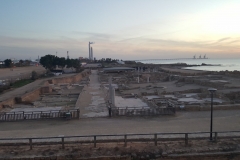

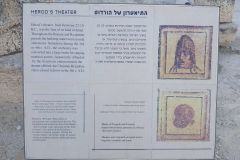
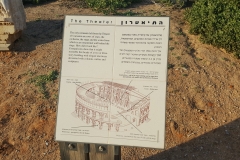
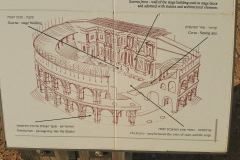
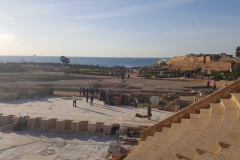

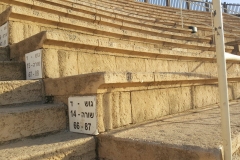
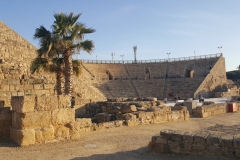
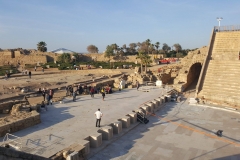
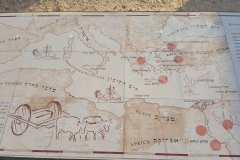

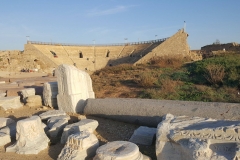

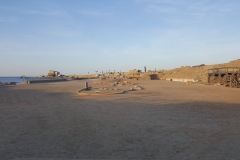
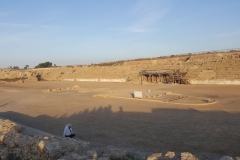
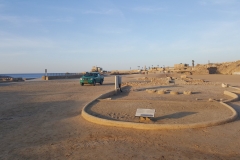
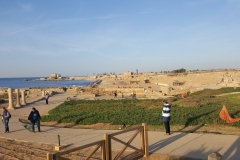
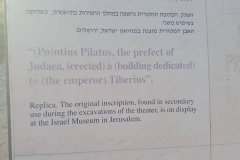
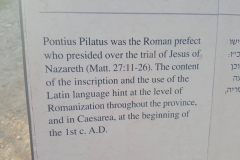
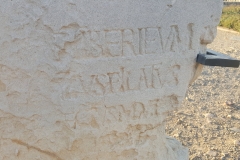
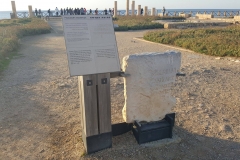
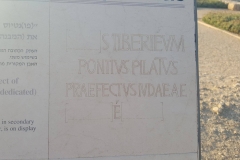
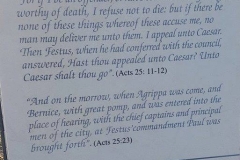
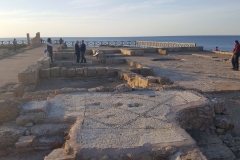
 Biblical Moment No. 5 of Andy’s Spiritual Journey to Israel & Palestine… King Herod’s Caesarea was a very important part of the Roman Empire at the time… but the presence of Saint Paul the Apostle and Saint Peter the Apostle in Caesarea had lasting and dynamic implications for Christianity and the world. Cornelius, a Gentile, would be converted and baptized in the name of Jesus Christ and become one of the early Christians. Here is the biblical account of Saint Peter the Apostle in Caesarea:
Biblical Moment No. 5 of Andy’s Spiritual Journey to Israel & Palestine… King Herod’s Caesarea was a very important part of the Roman Empire at the time… but the presence of Saint Paul the Apostle and Saint Peter the Apostle in Caesarea had lasting and dynamic implications for Christianity and the world. Cornelius, a Gentile, would be converted and baptized in the name of Jesus Christ and become one of the early Christians. Here is the biblical account of Saint Peter the Apostle in Caesarea: “Now there was a man at Caesarea named Cornelius, a centurion of what was called the Italian cohort, a devout man and one who feared God with all his household, and gave many alms to the Jewish people and prayed to God continually. About the ninth hour of the day he clearly saw in a vision an angel of God who had just come in and said to him, “Cornelius!” And fixing his gaze on him and being much alarmed, he said, “What is it, Lord?” And he said to him, “Your prayers and alms have ascended as a memorial before God. Now dispatch some men to Joppa and send for a man named Simon, who is also called Peter; he is staying with a tanner named Simon, whose house is by the sea.” When the angel who was speaking to him had left, he summoned two of his servants and a devout soldier of those who were his personal attendants, and after he had explained everything to them, he sent them to Joppa.
“Now there was a man at Caesarea named Cornelius, a centurion of what was called the Italian cohort, a devout man and one who feared God with all his household, and gave many alms to the Jewish people and prayed to God continually. About the ninth hour of the day he clearly saw in a vision an angel of God who had just come in and said to him, “Cornelius!” And fixing his gaze on him and being much alarmed, he said, “What is it, Lord?” And he said to him, “Your prayers and alms have ascended as a memorial before God. Now dispatch some men to Joppa and send for a man named Simon, who is also called Peter; he is staying with a tanner named Simon, whose house is by the sea.” When the angel who was speaking to him had left, he summoned two of his servants and a devout soldier of those who were his personal attendants, and after he had explained everything to them, he sent them to Joppa.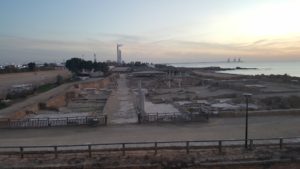 On the next day, as they were on their way and approaching the city, Peter went up on the housetop about the sixth hour to pray. But he became hungry and was desiring to eat; but while they were making preparations, he fell into a trance; and he *saw the sky opened up, and an object like a great sheet coming down, lowered by four corners to the ground, and there were in it all kinds of four-footed animals and crawling creatures of the earth and birds of the air. A voice came to him, “Get up, Peter, kill and eat!” But Peter said, “By no means, Lord, for I have never eaten anything unholy and unclean.” Again a voice came to him a second time, “What God has cleansed, no longer consider unholy.” This happened three times, and immediately the object was taken up into the sky.
On the next day, as they were on their way and approaching the city, Peter went up on the housetop about the sixth hour to pray. But he became hungry and was desiring to eat; but while they were making preparations, he fell into a trance; and he *saw the sky opened up, and an object like a great sheet coming down, lowered by four corners to the ground, and there were in it all kinds of four-footed animals and crawling creatures of the earth and birds of the air. A voice came to him, “Get up, Peter, kill and eat!” But Peter said, “By no means, Lord, for I have never eaten anything unholy and unclean.” Again a voice came to him a second time, “What God has cleansed, no longer consider unholy.” This happened three times, and immediately the object was taken up into the sky. Now while Peter was greatly perplexed in mind as to what the vision which he had seen might be, behold, the men who had been sent by Cornelius, having asked directions for Simon’s house, appeared at the gate; and calling out, they were asking whether Simon, who was also called Peter, was staying there. While Peter was reflecting on the vision, the Spirit said to him, “Behold, three men are looking for you. But get up, go downstairs and accompany them without misgivings, for I have sent them Myself.” Peter went down to the men and said, “Behold, I am the one you are looking for; what is the reason for which you have come?” They said, “Cornelius, a centurion, a righteous and God-fearing man well-spoken of by the entire nation of the Jews, was divinely directed by a holy angel to send for you to come to his house and hear a message from you.” So he invited them in and gave them lodging.
Now while Peter was greatly perplexed in mind as to what the vision which he had seen might be, behold, the men who had been sent by Cornelius, having asked directions for Simon’s house, appeared at the gate; and calling out, they were asking whether Simon, who was also called Peter, was staying there. While Peter was reflecting on the vision, the Spirit said to him, “Behold, three men are looking for you. But get up, go downstairs and accompany them without misgivings, for I have sent them Myself.” Peter went down to the men and said, “Behold, I am the one you are looking for; what is the reason for which you have come?” They said, “Cornelius, a centurion, a righteous and God-fearing man well-spoken of by the entire nation of the Jews, was divinely directed by a holy angel to send for you to come to his house and hear a message from you.” So he invited them in and gave them lodging. And on the next day he got up and went away with them, and some of the brethren from Joppa accompanied him. On the following day he entered Caesarea. Now Cornelius was waiting for them and had called together his relatives and close friends. When Peter entered, Cornelius met him, and fell at his feet and worshiped him. But Peter raised him up, saying, “Stand up; I too am just a man.” As he talked with him, he entered and found many people assembled. And he said to them, “You yourselves know how unlawful it is for a man who is a Jew to associate with a foreigner or to visit him; and yet God has shown me that I should not call any man unholy or unclean. That is why I came without even raising any objection when I was sent for. So I ask for what reason you have sent for me.”
And on the next day he got up and went away with them, and some of the brethren from Joppa accompanied him. On the following day he entered Caesarea. Now Cornelius was waiting for them and had called together his relatives and close friends. When Peter entered, Cornelius met him, and fell at his feet and worshiped him. But Peter raised him up, saying, “Stand up; I too am just a man.” As he talked with him, he entered and found many people assembled. And he said to them, “You yourselves know how unlawful it is for a man who is a Jew to associate with a foreigner or to visit him; and yet God has shown me that I should not call any man unholy or unclean. That is why I came without even raising any objection when I was sent for. So I ask for what reason you have sent for me.”
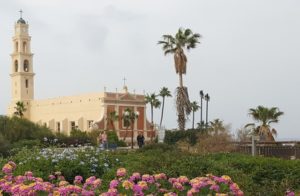
 There Saint Peter receives a Vision of the Spirit. Then he travels to Caesarea to visit Cornelius and understands that Vision to be that all people, Gentiles included are welcome and eligible for the Salvation of the Lord. “Surely no one can refuse the water for these to be baptized who have received the Holy Spirit just as we did, can he?” And he ordered them (Gentiles) to be baptized in the name of Jesus Christ.
There Saint Peter receives a Vision of the Spirit. Then he travels to Caesarea to visit Cornelius and understands that Vision to be that all people, Gentiles included are welcome and eligible for the Salvation of the Lord. “Surely no one can refuse the water for these to be baptized who have received the Holy Spirit just as we did, can he?” And he ordered them (Gentiles) to be baptized in the name of Jesus Christ.





























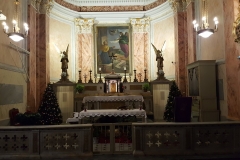

 Diane Mogannam Straetker: I’m smiling!!!
Diane Mogannam Straetker: I’m smiling!!! Katherine Deen Way: So cool! Where are you spending Christmas? Bethlehem?
Katherine Deen Way: So cool! Where are you spending Christmas? Bethlehem?





